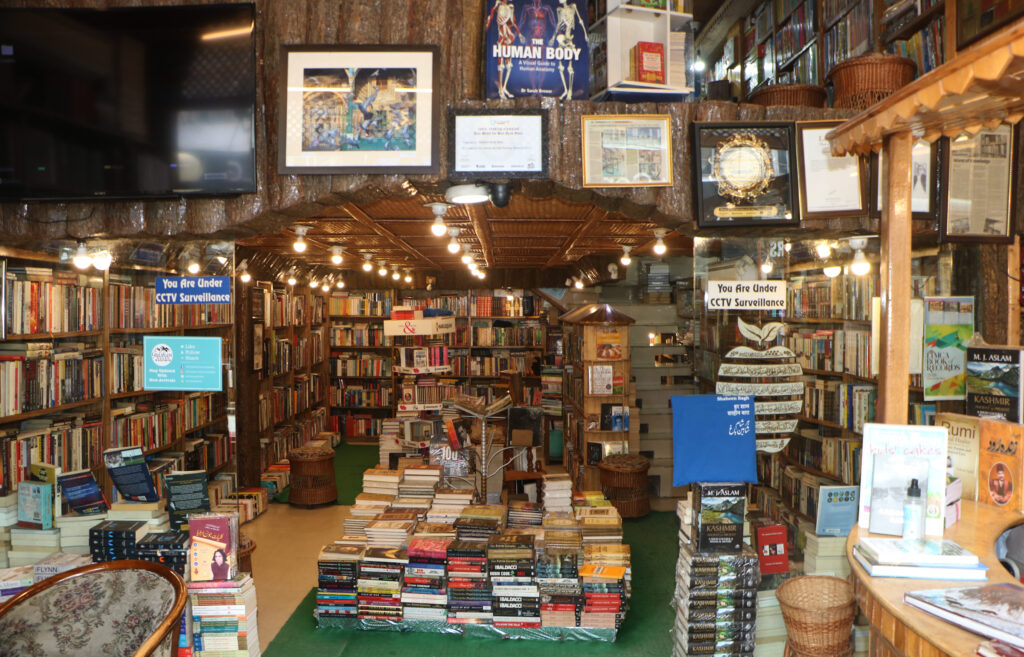Having made it to the Limca Book of Records for having more than 80,000 books and being the only library-bookshop located on an island in India, Gulshan Books is a model bookstore.
Saqib Mugloo
In the last week of July, as rains splashed over the streets of Srinagar, two young girls braving puddles and showers made their way into one of the oldest and the most frequented book stores of Kashmir: Gulshan Books.
“I can’t believe it, after two years of hard work I am finally going to publish my own book,” one of the girls exclaimed as others around looked in awe.
The girl, who wished not to be named before the publication of her novel, credited the store, among other reasons, for her forthcoming book. “It comprises 300 pages and is a work of fiction on a subject that I cannot share now,” she said.
She further said that she had been shopping at the store for over 10 years. “This has been a go-to place for me since my early teenage days. Despite books being available online, I prefer this shop,” she said. “I was introduced to Gulshan Books by my father during school days,” she added.
Gulshan Books has a rich history. It was established before the partition of the British-ruled India.
“I am the fourth generation in this trade. Back in the day, the books would be published in Lahore before they were marketed here. My great grandfather Sheikh Mohammad Ibrahim had a shop in Pattan in north Kashmir,” Sheikh Aijaz said.
Pattan, said Ajaz, was the spot where all the vehicles coming from Muzaffarabad would converge. Later his grandfather shifted the shop from Pattan to Chattabal in Srinagar. In the summer capital, the Sheikhs opened two more shops.
“My father and uncle joined the business back then as we established one more shop in Maharaj Gunj area of downtown in Srinagar,” he said. Their publication, at that time, was named Sheikh Mohammad Usman and Sons.
It was in the 1970s that the Gulshan Books division – which started publishing English books – came into being. “Since Gulshan is an identity of Kashmir, so we named it the same. There is no story or incident related to the name of our store,” Aijaz revealed. ‘Gulshan’ is the Urdu word for ‘garden’ and the reference is apt given that the valley of Kashmir is renowned world over for its scenic beauty.
It was this shop that catered to the Persian and Urdu loving readers of Kashmir before the partition. “We have published many books in Persian in the past,” said Aijaz. “In the 1990s, however, we focused on Jammu and Kashmir, Ladakh, and Sufism,” he said.
The books then published mainly focused on history, tourism, culture and education of the erstwhile state of Jammu and Kashmir. This despite a raging conflict making headlines across the world. “In the 70s and 80s, we would publish general books like, a book on world economy or history of English literature, or something on the economic botany of India or the world etc. Then we aimed at publishing books about our region, as we thought, for stuff like botany and such, there was a whole world to do it,” he explained.
Not only has the house published thousands of books on Kashmir but it has also been a platform for writers who would later earn a name for themselves. “We have published books by Professor Fida Mohammad Hasnain, ZG Mohammad and many others,” said Aijaz.
Gulshan Books has also produced dozens of writers in Kashmir thanks to its publication. The store has been a favourite spot for dignitaries who make sure they visit it every now and then. Among those who frequented the store was former governor of Jammu and Kashmir N N Vohra. “Karan Singh would visit the book store whenever he was in Kashmir, so would his son,” said Aijaz.
Noted historian and writer Ramachandra Guha expressed his admiration for the bookshop in 2015. Writing for Hindustan Times, Guha said: “This is Gulshan, sited on Residency Road in Srinagar. Visiting the store earlier this year, I was both charmed and impressed. It is spacious, and has a great deal of light. The books are tastefully arranged; in the shop-windows, on shelves, and on the floor in the middle of the store, around which one can walk while browsing.”
In the article ‘The enduring charm of independent bookstores’, Guha further wrote: “I spent a fulfilling hour-and-a-half at Gulshan, following which I bought a new bag on the street outside, since the suitcase I had brought from Bangalore had no space left.”
He further said that the shop had many books on history, religion, and politics in Kashmir, these printed in English as well as Urdu. “But it also had a decent selection of more general books. I bought some books on Kashmir, an autobiography of a Delhi publisher, a book on the prison days of the police officer-turned rebel Simranjit Singh Mann—all for myself, as well as a superb illustrated history of modern design (published by Flammarion) for my wife.”
Swept off his feet by the book store’s charm, Guha concluded with a telling compliment: “Old and favourite bookstores fade away or die. But new ones must arise to take their place. To prospective owners of independent bookstores, may I offer the Gulshan model; a representative selection of the best books on the city and state the store is located in, these printed in English and the vernacular, with this local patriotism complemented by books of quality on India and the world.”
Amid much fanfare, the Gulshan book store opened one more branch in 2016. The shop, nestled at Nehru Park of Dal Lake, was unique as it had an enchanting surrounding: a lake, its houseboats and the mighty Zabarwan mountain range.
With over 80,000 books, the shop was a must-visit for bookworms. Soon it made its way into the Limca Book of Records for having more than 80,000 books and being the only library-bookshop located on an island in India. “It was a proud moment for Kashmir,” said Aijaz.
Former BBC journalist Andrew Whitehead, who has extensively reported on Kashmir, after visiting the bookstore in 2017 wrote on his website that it is “one of the best bookshops not simply in Kashmir (no, there’s not a lot of competition) but in South Asia.”
And rightly so, as the place was a book lover’s delight. Here you would find yourself surrounded by thousands of books amidst the thrill of Dal Lake. The reader had access to a reading-room café, a reader’s corner with a view of the lake, moving Shikaras, colourful houseboats, and the city fort.
The bookshop had otherwise out-of-print books on Kashmir, travelogues on Kashmir written by the British travelers, some of them three centuries old.
The Dal lake branch was opened after the devastating floods of 2014 that caused losses worth billions of dollars in Kashmir. Gulshan Books was affected too. Aijaz said that the water had reached the first floor of the store. “We suffered losses worth millions, but unfortunately no one in the government helped us. It was God’s mercy alone that we were able to resume and open one iconic branch in the middle of Dal Lake,” he said.
It was he who had approached the then chief minister Mufti Mohammad Sayeed with the idea of having a bookshop at Nehru Park on Dal Lake. Mufti readily agreed. In 2016, after its inauguration, Chief Minister Mehbooba Mufti herself visited the bookstore.
Earlier this year, the shop was closed by the government and the contract was not extended to the bookstore located at the second storey of the Jammu and Kashmir Tourist Corporation building in Nehru Park Island. “We asked them to grant us another few years, but they did not agree. Earlier they had granted us a five-year contract which was extended by one year. But this time they did not,” Ajaz said.
While there are many challenges that the publication has faced, it continues to flourish as was evident in the opening of one more shop at the Srinagar airport. Gulshan Books has a branch in Ladakh as well. Ladakh was a part of the erstwhile state of Jammu and Kashmir and is now an independent union territory.
“We overcame floods, then the (challenge of) online market and we will overcome the closure of the Nehru Park store too,” said a determined Ajaz.
And to make inroads into the online marketing, he said the publication is planning to venture into PDF formatting of books. The proverbial sky is the limit for this exemplary chain of bookstores.


